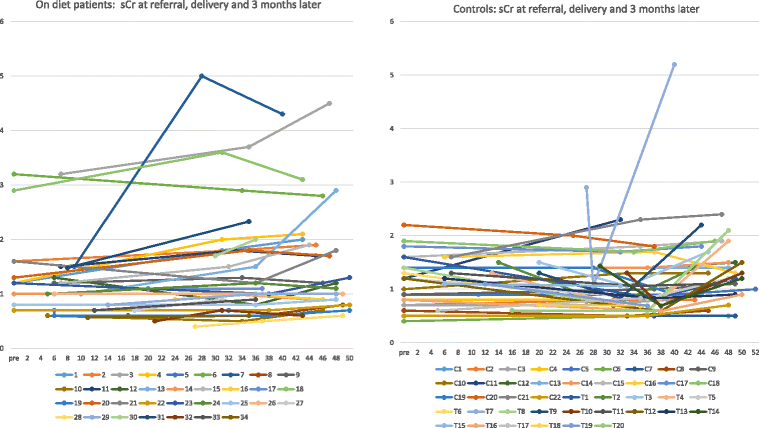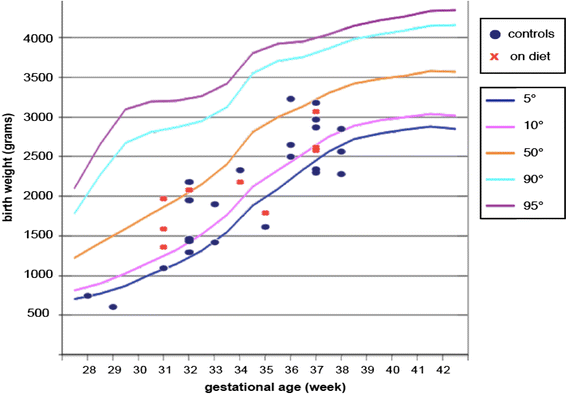Vegan-vegetarian low-protein supplemented diets in pregnant CKD patients: fifteen years of experience
- PMID: 27649693
- PMCID: PMC5029029
- DOI: 10.1186/s12882-016-0339-y
Vegan-vegetarian low-protein supplemented diets in pregnant CKD patients: fifteen years of experience
Abstract
Background: Pregnancy in women with advanced CKD becoming increasingly common. However, experience with low-protein diets in CKD patients in pregnancy is still limited. Aim of this study is to review the results obtained over the last 15 years with moderately restricted low-protein diets in pregnant CKD women (combining: CKD stages 3-5, proteinuria: nephrotic at any time, or > =1 g/24 at start or referral; nephrotic in previous pregnancy). CKD patients on unrestricted diets were employed for comparison.
Study period: January, 2000 to September, 2015: 36 on-diet pregnancies (31 singleton deliveries, 3 twin deliveries, 1 pregnancy termination, 1 miscarriage); 47 controls (42 singleton deliveries, 5 miscarriages). The diet is basically vegan; since occasional milk and yoghurt are allowed, we defined it vegan-vegetarian; protein intake (0.6-0.8 g/Kg/day), keto-acid supplementation, protein-unrestricted meals (1-3/week) are prescribed according to CKD stage and nutritional status. Statistical analysis was performed as implemented on SPSS.
Results: Patients and controls were similar (p: ns) at baseline with regard to age (33 vs 33.5), referral week (7 vs 9), kidney function (CKD 3-5: 48.4 % vs 64.3 %); prevalence of hypertension (51.6 % vs 40.5 %) and proteinuria >3 g/24 h (16.1 % vs 12.2 %). There were more diabetic nephropathies in on-diet patients (on diet: 31.0 % vs controls 5.3 %; p 0.007 (Fisher)) while lupus nephropathies were non-significantly higher in controls (on diet: 10.3 % vs controls 23.7 %; p 0.28 (Fisher)). The incidence of preterm delivery was similar (<37 weeks: on-diet singletons 77.4 %; controls: 71.4 %). The incidence of other adverse pregnancy related outcomes was non-significantly lower in on-diet patients (early preterm delivery: on diet: 32.3 % vs controls 35.7 %; birth-weight = <1.500 g: on diet: 9.7 % vs controls 23.8 %). None of the singletons in the on-diet series died, while two perinatal deaths occurred among the controls (p = 0.505). The incidence of small for gestational age (SGA <10th centile) and/or extremely preterm babies (<28th week) was significantly lower in singletons from on-diet mothers than in controls (on diet: 12.9 % vs controls: 33.3 %; p: 0.04 (Fisher)).
Conclusion: Moderate protein restriction in the context of a vegan-vegetarian supplemented diet is confirmed as a safe option in the management of pregnant CKD patients.
Keywords: CKD; Low-protein diets; Maternal-foetal outcomes; Pregnancy; Preterm delivery; Small for gestational age baby; Supplemented diets.
Figures





References
-
- Piccoli GB, Mezza E, Grassi G, Burdese M, Todros T. A 35 year old woman with diabetic nephropathy who wants a baby: case outcome. BMJ. 2004;329:900.2.
Publication types
MeSH terms
LinkOut - more resources
Full Text Sources
Other Literature Sources
Medical
Miscellaneous

